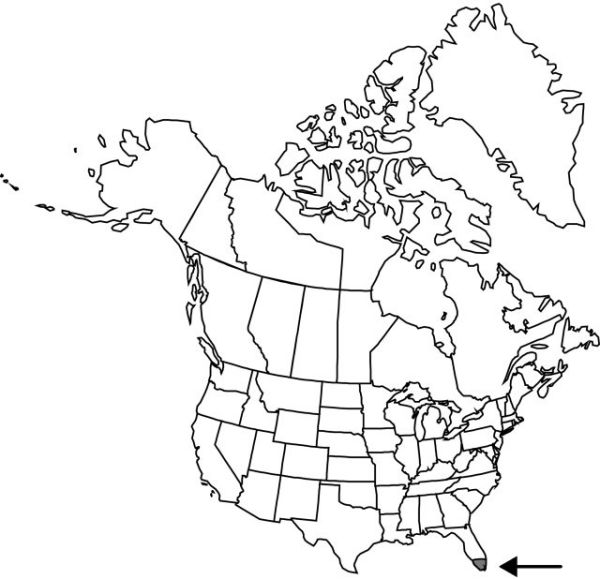Vanilla phaeantha
Flora 48: 274. 1865.
Roots usually 1 per node, aerial portions 1–2 mm diam. Stems occasionally branched, leafy, thick, 8–12 mm diam., smooth. Leaves persistent; blade oblongelliptic, flat, equal to or shorter than internodes, to 15 × 2.5–5 cm, fleshy-leathery, tapering to acute apex. Inflorescences axillary, 12-flowered racemes, short-pedunculate, ± to 8 cm excluding peduncle; floral bracts foliaceous, ovate, cucullate, to 2.5 × 1.5 cm, fleshy. Flowers: sepals and petals spreading, green, fleshy, rigid; sepals narrowly oblanceolate, 7–9 × 1.3–2 cm, margins straight, apex obtuse to acute, spreading; petals obliquely narrowly oblanceolate, abaxially keeled, thinner than sepals, 6.5–8 ×1–1.5 cm, apex acute to subacuminate; lip adnate to column for 3 cm, white becoming yellow-cream toward apex, lamina gulletlike, cuneate, obovate, clawed, obscurely 3-lobed distally, to 7.5–9 × 3.5–4 cm when spread, lateral lobes arching over column, margins involute, apex rounded, middle lobe broadly subquadrangular, margins undulate, apex retuse; disc with multiple longitudinal ribs, central tuft of retrorse scales, thickened broad rib extending from tuft to apex; column curved distal to middle, white, slender, 6.5 cm, adaxially bearded; pollinia yellow; pedicellate ovary 4–8 cm. Berries cylindric, 8–10 × 1 cm.
Phenology: Flowering Apr–Jul.
Habitat: Cypress swamps, hammocks
Elevation: 0–20 m
Distribution

Fla., West Indies (Trinidad)
Discussion
Vanilla phaeantha is known in the flora area only from Collier County, Florida (P. M. Brown 2002).
Selected References
None.